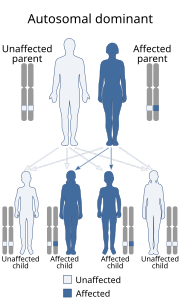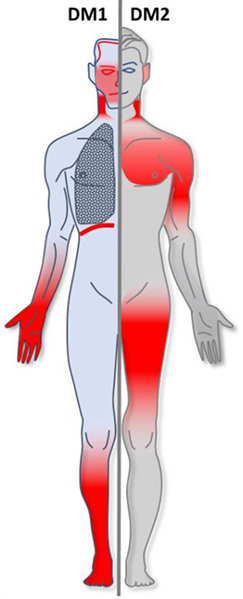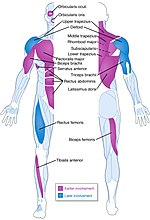In genetics, trinucleotide repeat disorders, a subset of microsatellite expansion diseases (also known as repeat expansion disorders), are a set of over...
26 KB (2,709 words) - 21:06, 9 October 2024
A trinucleotide repeat expansion, also known as a triplet repeat expansion, is the DNA mutation responsible for causing any type of disorder categorized...
61 KB (7,973 words) - 11:50, 13 September 2024
Anticipation (genetics) (category Genetic disorders by mechanism)
severity of symptoms is also noted. Anticipation is common in trinucleotide repeat disorders, such as Huntington's disease and myotonic dystrophy, where...
5 KB (710 words) - 20:32, 5 December 2023
the most commonly observed manifestations of this process. Trinucleotide repeat disorders also follow a non-Mendelian pattern of inheritance. These diseases...
22 KB (2,627 words) - 12:41, 24 August 2024
Huntington's disease (category Trinucleotide repeat disorders)
influenced by the sex of the affected parent. HD is one of several trinucleotide repeat disorders that are caused by the length of a repeated section of a gene...
138 KB (14,465 words) - 09:38, 17 November 2024
called a trinucleotide repeat (for example: CAGCAGCAGCAG...), and abnormalities in such regions can give rise to trinucleotide repeat disorders. When between...
10 KB (1,118 words) - 16:49, 12 July 2024
Microsatellite (redirect from Short tandem repeat)
disorder in humans. Length changes in other triplet repeats are linked to more than 40 neurological diseases in humans, notably trinucleotide repeat disorders...
67 KB (7,394 words) - 16:46, 2 September 2024
Dentatorubral–pallidoluysian atrophy (category Trinucleotide repeat disorders)
caused by expanded CAG repeats encoding polyglutamine (polyQ) stretches (see: Trinucleotide repeat disorder). The expanded CAG repeats create an adverse gain-of-function...
23 KB (2,513 words) - 22:07, 9 September 2024
Fragile X syndrome (category Trinucleotide repeat disorders)
This disorder and finding of fragile X syndrome has an X-linked dominant inheritance. It is typically caused by an expansion of the CGG triplet repeat within...
60 KB (6,815 words) - 01:58, 22 November 2024
disease in the person with the excess number of repeats. Fragile X syndrome, a trinucleotide repeat disorder, is a condition in which premutations may be...
2 KB (177 words) - 17:59, 23 July 2024
Myotonic dystrophy (category Trinucleotide repeat disorders)
(CTG) triplet repeats, termed trinucleotide repeat expansion and classifying DM1 as one of several trinucleotide repeat disorders. This expansion occurs...
43 KB (4,557 words) - 07:24, 11 November 2024
Friedreich's ataxia (category Trinucleotide repeat disorders)
frataxin. In 96% of cases, the mutant FXN gene has 90–1,300 GAA trinucleotide repeat expansions in intron 1 of both alleles. This expansion causes epigenetic...
47 KB (4,942 words) - 03:39, 20 November 2024
chromosome extra, missing, or both (see chromosome abnormality) T – Trinucleotide repeat disorders: gene is extended in length "OMIM Entry - # 118220 - CHARCOT-MARIE-TOOTH...
43 KB (995 words) - 08:29, 11 November 2024
as other repeat disorders. This hexanucleotide variant of a trinucleotide repeat disorder produces five different dipeptides by RAN translation, these...
31 KB (3,542 words) - 21:42, 15 September 2024
Repeated sequence (DNA) (redirect from Dna repeat)
diseases. Specifically, tandem repeat sequences, underlie several human disease conditions, particularly trinucleotide repeat diseases such as Huntington's...
31 KB (3,652 words) - 06:24, 26 September 2024
Neurodegenerative disease (redirect from Neurodegenerative disorder)
Diseases associated with such mutations are known as trinucleotide repeat disorders. Polyglutamine repeats typically cause dominant pathogenesis. Extra glutamine...
63 KB (6,940 words) - 01:18, 18 November 2024
with the increase in glutamine concentration. Isoglutamine Trinucleotide repeat disorder PolyQ tract "FDA approves new treatment for sickle cell disease"...
28 KB (2,559 words) - 01:39, 9 September 2024
Huntington's disease-like syndrome (category Trinucleotide repeat disorders)
disorder linked to chromosome 4p15.3. It has only been reported in two families, and the causative gene is unidentified. Other neurogenetic disorders...
4 KB (354 words) - 20:56, 28 July 2024
than that of trinucleotide repeat disorders, since D4Z4 repeats are much larger than trinucleotide repeats, an underabundance of repeats (rather than...
176 KB (16,456 words) - 00:30, 6 November 2024
during the DNA synthesis step of DNA repair processes. Within DNA trinucleotide repeat sequences, the repair of DNA damage by the processes of homologous...
10 KB (1,175 words) - 10:24, 15 November 2024
Spinocerebellar ataxia type 6 (category Trinucleotide repeat disorders)
two disorders. SCA6 is caused by mutations in CACNA1A, a gene encoding a calcium channel α subunit. These mutations tend to be trinucleotide repeats of...
12 KB (1,434 words) - 07:07, 22 November 2024
class of autosomal and X-linked dominant diseases known as trinucleotide repeat disorders (for example, Huntington's disease), a molecular mechanism for...
8 KB (885 words) - 17:55, 13 November 2024
Hyperkinesia (category Neurological disorders)
be associated with post-stroke hyperkinesia. DRPLA is a rare trinucleotide repeat disorder (polyglutamine disease) that can be juvenile-onset (< 20 years)...
45 KB (5,754 words) - 10:57, 15 February 2024
times, give rise to numerous known diseases, including the trinucleotide repeat disorders. Robert I. Richards and Grant R. Sutherland called these phenomena...
3 KB (370 words) - 00:16, 23 January 2024
part of a class of neurodegenerative disorders known as trinucleotide repeat disorders or polyglutamine disorders. The key sequence which is found in Huntington's...
30 KB (3,263 words) - 00:38, 26 August 2024
biological database of polyglutamine repeats in disease and non-disease associated proteins. Trinucleotide repeat disorder Robertson, Amy L; Bate Mark A; Androulakis...
1 KB (77 words) - 00:37, 14 August 2024
Spinocerebellar ataxia type 1 (category Trinucleotide repeat disorders)
can occur in some cases. It is caused by an expanded number of trinucleotide repeats in the polyglutamine tract of the ATXN1 gene, which encodes the...
85 KB (10,375 words) - 02:05, 21 May 2024
Sierra Leone CGG, a codon for the amino acid arginine CGG repeats, a trinucleotide repeat disorder; causing: Fragile X syndrome Fragile X-associated tremor/ataxia...
755 bytes (119 words) - 11:26, 28 June 2024
Proteinopathy (category Neurological disorders)
0b013e328356d328. PMID 22918486. Orr HT, Zoghbi HY (July 2007). "Trinucleotide repeat disorders". Annual Review of Neuroscience. 30 (1): 575–621. doi:10.1146/annurev...
62 KB (4,598 words) - 16:27, 17 November 2024
SMRT sequencing. This is an example of a Trinucleotide repeat disorder. Trinucleotide repeat expansion is likely a consequence of strand slippage either...
27 KB (3,455 words) - 12:19, 13 May 2024















